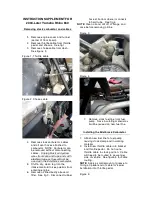
Steering and touch detection
The driver is required to keep their hands on the
steering wheel at all times and be able to inter‐
vene at any time to correct the course of the
vehicle and keep it in lane. The driver must
expect a change from active to passive mode or
vice versa at any time.
If the driver has not steered the vehicle for a
considerable period of time or has removed their
hands from the steering wheel, an optical warn‐
ing is given first. Display
1
appears in the mul‐
tifunction display. If the driver still does not steer
the vehicle, or gives no confirmation to the sys‐
tem, a warning tone sounds in addition to the
visual warning message.
The warning is not issued, or is stopped, when
the driver gives confirmation to the system:
R
The driver steers the vehicle.
R
The driver presses a steering wheel button or
operates Touch Control.
If Active Steering Assist detects that a system
limit has been reached, a visual and acoustic
warning is issued.
Active Steering Assist is only an aid. The driver is
responsible for the distance to the vehicle in
front, for vehicle speed, for braking in good time
and for staying in lane. Before changing lanes,
the driver must make sure that the neighbouring
lane is free (glance over the shoulder).
System limits
Active Steering Assist has a limited steering tor‐
que for lateral guidance. In some cases, the
steering intervention is not sufficient to keep the
vehicle in the lane or to drive through exits.
The system may be impaired or may not function
in the following instances:
R
There is poor visibility, e.g. due to snow, rain,
fog, heavy spray, greatly varying light condi‐
tions or strong shadows on the carriageway.
R
There is glare, e.g. from oncoming traffic,
direct sunlight or reflections.
R
Insufficient road illumination.
R
The windscreen is dirty, misted up, damaged
or covered in the vicinity of the camera, e.g.
by a sticker.
R
No, or several, unclear lane markings are
present for one lane, or the markings change
quickly, e.g. in a construction area or junc‐
tions.
R
The lane markings are worn away, dark or
covered up, e.g. by dirt or snow.
R
The distance to the vehicle in front is too
small and the lane markings thus cannot be
detected.
R
The road is narrow and winding.
R
There are obstacles on the lane or projecting
out into the lane, such as object markers.
214 Driving and parking
Summary of Contents for GLC 2019
Page 2: ......
Page 3: ......
Page 9: ...Left hand drive vehicles 6 At a glance Cockpit...
Page 11: ...Q Electric parking brake 187 R Light switch 128 8 At a glance Cockpit...
Page 12: ......
Page 13: ...Instrument display standard 10 At a glance Warning and indicator lamps...
Page 15: ...Instrument display in the widescreen cockpit 12 At a glance Warning and indicator lamps...
Page 17: ...14 At a glance Overhead control panel...
Page 19: ...16 At a glance Door control panel and seat adjustment...
Page 21: ...18 At a glance Emergencies and breakdowns...
Page 642: ......
Page 643: ......
Page 644: ......
Page 645: ......
















































